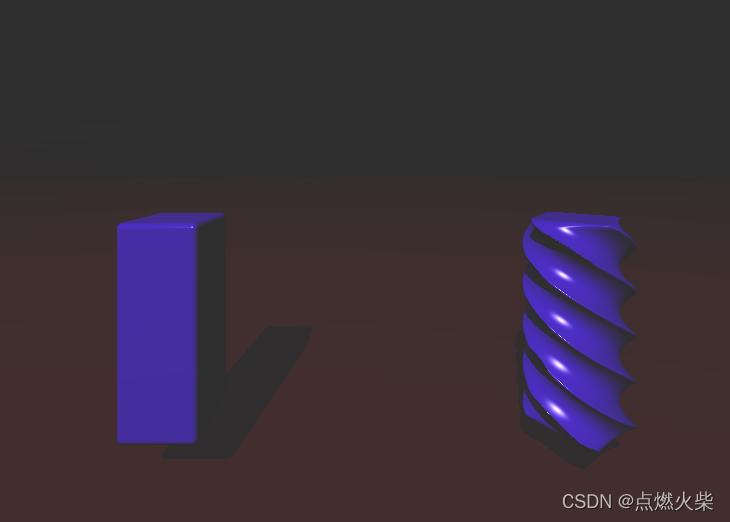对模型进行扭曲、弯曲、裁剪、掏空操作
1. demo效果



如上图所示,第一张是对方形圆柱进行扭曲操作的效果图,第二张图是对扁平立方体面进行弯曲操作的效果图,第三张图是从内到外依次是原物体,裁剪后的物体,裁剪后掏空物体的效果,从左到右依次对圆柱、球体、甜圈圈进行同样变换的效果
2. 实现要点
先回顾一下之前学习的SDF建模相关的一些操作,首先学习了基本变换旋转、缩放、平移,之后学习了通过布尔运算(交集、并集、差集)组合模型 ,进而拓展了平滑布尔运算组合模型,今天解锁一点点新的技能,对模型进行扭曲、弯曲、裁剪、掏空操作
2.1 模型扭曲
通过前面的demo效果展示知道,我们首先绘制了一个长条状的立方体,然后又绘制了一个以同样立方体扭曲后的物体,实现的核心思想就是变换用来绘制扭曲立方体的坐标,即依据y分量的变化使x分量和z分量转圈圈,具体代码如下
vec3 opTwistY( in vec3 p ,float k)
{
float c = cos(k*p.y);
float s = sin(k*p.y);
mat2 m = mat2(c,-s,s,c);
p.xz *=m;
return p;
}
如果你想物体绕z轴或x轴扭曲,两种办法,一是先按y轴扭曲然后将物体旋转,二是将上面的函数中的分量替换为对应的坐标轴
扭曲的坐标处理完接着就是像之前一样绘制图形,为了方便使用我们将绘制过程封装成了一个函数,具体如下
vec2 twistBox (vec4 pos){
//绘制原立方体
pos.x += 2.5;
float box1 = sdBox(pos.xyz,vec3(0.4,1.2,0.4),0.06);//方块
vec2 mBox1 = vec2(box1,1.0);
//绘制扭曲立方体
pos.x -= 5.0;
pos.xyz=opTwistY(pos.xyz,3.0);//扭曲
float box2 = sdBox(pos.xyz,vec3(0.4,1.2,0.4),0.06);//方块
vec2 mBox2 = vec2(box2,1.0);
vec2 res = opU(mBox1,mBox2);
return res;
}
调用过程如下
vec2 res = vec2(p.y,0.0);//地面
vec3 pos = p-vec3(0,2,5);//确定模型的中心
vec4 oriPos = vec4(pos,1.0);//转为其次坐标
//扭曲
vec2 twistBox = twistBox(oriPos);
res = opU(res,twistBox);//扭曲立方体
2.2 模型弯曲
弯曲也是同样的思想,通过改变绘制弯曲模型的坐标来实现,返回弯曲坐标的函数如下
vec3 opCheapBend(in vec3 p ,float k)
{
float c = cos(k*p.x);
float s = sin(k*p.x);
mat2 m = mat2(c,-s,s,c);
vec3 q = vec3(m*p.xy,p.z);
return q;
}
像上一次一样,使用处理好的坐标绘制图形即可,这次也将绘制过程封装成了一个函数,具体如下
vec2 cheapBendBox (vec4 pos){
//绘制原立方体面
pos.x += 2.5;
float box1 = sdBox(pos.xyz,vec3(1.0,0.2,0.6),0.06);//方块
vec2 mBox1 = vec2(box1,1.0);
//绘制弯曲立方体面
pos.x -= 5.0;
pos.xyz=opCheapBend(pos.xyz,0.5);//弯曲
float box2 = sdBox(pos.xyz,vec3(1.0,0.2,0.6),0.06);//方块
vec2 mBox2 = vec2(box2,1.0);
vec2 res = opU(mBox1,mBox2);
return res;
}
调用过程如下
vec2 res = vec2(p.y,0.0);//地面
vec3 pos = p-vec3(0,2,5);//确定模型的中心
vec4 oriPos = vec4(pos,1.0);//转为其次坐标
//扭曲
vec2 twistBox = twistBox(oriPos);
//弯曲
vec2 cheapBendBox = cheapBendBox(oriPos);
//res = opU(res,twistBox);//扭曲立方体
res = opU(res,cheapBendBox); //弯曲立方体
2.3 模型裁剪与掏空
2.3.1 球体裁剪与掏空
掏空函数
//掏空
float opOnion(float sdf, in float thickness )
{
return abs(sdf)-thickness;
}
绘制过程是,我们首先绘制了一个完整的球体,然后绘制了一个裁剪的球体,最后绘制一个掏空且裁剪的球体,之所以也裁剪是因为不裁剪的画我们看不到内部结构,具体如下
vec2 onionSphere (vec4 pos){
//绘制球体
vec4 pos1 = pos;
pos1.z -= 6.0;
float sphere1 = sdSphere(pos1.xyz,0.6);
vec2 mSphere1 = vec2(sphere1,2.0);
//绘制裁剪球体
vec4 pos2 = pos;
pos2.z -= 2.5;
float sphere2 = sdSphere(pos2.xyz,0.6);
sphere2 = max( sphere2, pos2.y );//裁剪
vec2 mSphere2 = vec2(sphere2,2.0);
//绘制裁剪掏空球体
vec4 pos3 = pos;
float sphere3 = sdSphere(pos3.xyz,0.6);
sphere3 = opOnion(sphere3,0.01);//掏空
sphere3 = max( sphere3, pos3.y );//裁剪
vec2 mSphere3 = vec2(sphere3,2.0);
vec2 res = opU(mSphere1,mSphere2);
res = opU(res,mSphere3);
return res;
}
关于裁剪,不知你有没有联想到,这里的裁剪效果是裁掉了y轴大于0 的部分,如果想裁掉x轴或z上的大于0的部分,只需把max( sphere3, pos3.y );//裁剪此处的分量y替换,如果你想要留下y轴上部分,即demo中裁掉和留下的部分互换,那么在y分量前添加负号即可,max( sphere3, -pos3.y );//裁剪,其他轴中的裁剪同理
2.3.2 圆柱裁剪与掏空
圆柱的实现与球体的思路一样,只不过把球体换成圆柱,如下
vec2 onionCylinder (vec4 pos){
//绘制圆柱
vec4 pos1 = pos;
pos1.z -= 6.0;
float cylinder1 = sdCylinder(pos1.xyz,0.4,0.6);
vec2 mCylinder1 = vec2(cylinder1,1.0);
//绘制裁剪圆柱
vec4 pos2 = pos;
pos2.z -= 2.5;
float cylinder2 = sdCylinder(pos2.xyz,0.4,0.6);
cylinder2 = max( cylinder2, pos2.y );//裁剪
vec2 mCylinder2 = vec2(cylinder2,1.0);
//绘制裁剪掏空圆柱
vec4 pos3 = pos;
float cylinder3 = sdCylinder(pos3.xyz,0.4,0.6);
cylinder3 = opOnion(cylinder3,0.01);//掏空
cylinder3 = max( cylinder3, pos3.y );//裁剪
vec2 mCylinder3 = vec2(cylinder3,1.0);
vec2 res = opU(mCylinder1,mCylinder2);
res = opU(res,mCylinder3);
return res;
}
2.3.3 甜圈圈裁剪与掏空
甜圈圈裁剪与掏空也是同样的思路,绘制过程如下
vec2 onionTorus (vec4 pos){
//绘制甜圈圈
vec4 pos1 = pos;
pos1.z -= 6.0;
float torus1 = sdTorus(pos1.xyz,vec2(0.6,0.2));
vec2 mTorus1 = vec2(torus1,3.0);
//绘制裁剪甜圈圈
vec4 pos2 = pos;
pos2.z -= 2.5;
float torus2 = sdTorus(pos2.xyz,vec2(0.6,0.2));
torus2 = max( torus2, pos2.y );//裁剪
vec2 mTorus2 = vec2(torus2,3.0);
//绘制裁剪掏空甜圈圈
vec4 pos3 = pos;
float torus3 = sdTorus(pos3.xyz,vec2(0.6,0.2));
torus3 = opOnion(torus3,0.01);//掏空
torus3 = max( torus3, pos3.y );//裁剪
vec2 mTorus3 = vec2(torus3,3.0);
vec2 res = opU(mTorus1,mTorus2);
res = opU(res,mTorus3);
return res;
}
3. demo代码
继续,可直接跑起来的代码
<body>
<div id="container"></div>
<script src="http://www.yanhuangxueyuan.com/versions/threejsR92/build/three.js"></script>
<script>
var container;
var camera, scene, renderer;
var uniforms;
var vertexShader = `
void main() {
gl_Position = vec4( position, 1.0 );
}
`
var fragmentShader = `
#ifdef GL_ES
precision mediump float;
#endif
uniform float u_time;
uniform vec2 u_mouse;
uniform vec2 u_resolution;
const int MAX_STEPS = 100;//最大步进步数
const float MAX_DIST = 100.0;//最大步进距离
const float SURF_DIST = 0.01;//相交检测临近表面距离
//绕z轴旋转矩阵
mat4 rotZ(float a) {
return mat4(cos(a),-sin(a),0.0,0.0,
sin(a),cos(a),0.0,0.0,
0.0,0.0,1.0,0.0,
0.0,0.0,0.0,1.0
);
}
//绕x轴旋转矩阵
mat4 rotX(float a) {
return mat4(1.0,0.0,0.0,0.0,
0.0,cos(a),-sin(a),0.0,
0.0,sin(a),cos(a),0.0,
0.0,0.0,0.0,1.0
);
}
//绕y轴旋转矩阵
mat4 rotY(float a) {
return mat4(cos(a),0.0,sin(a),0.0,
0.0,1.0,0.0,0.0,
-sin(a),0.0,cos(a),0.0,
0.0,0.0,0.0,1.0
);
}
//平滑交集
float opSmoothI( float d1, float d2, float k )
{
float h = max(k-abs(d1-d2),0.0);
return max(d1, d2) + h*h*0.25/k;
}
//平滑并集
float opSmoothU( float d1, float d2, float k )
{
float h = max(k-abs(d1-d2),0.0);
return min(d1, d2) - h*h*0.25/k;
}
//平滑差集
float opSmoothS( float d1, float d2, float k )
{
float h = max(k-abs(-d1-d2),0.0);
return max(-d1, d2) + h*h*0.25/k;
}
//掏空
float opOnion(float sdf, in float thickness )
{
return abs(sdf)-thickness;
}
//并集
vec2 opU( vec2 d1, vec2 d2 )
{
return (d1.x<d2.x) ? d1 : d2;
}
//球体
float sdSphere( vec3 p, float s )
{
return length(p)-s;
}
//立方体
float sdBox( vec3 p, vec3 b,float rad )
{
vec3 d = abs(p) - b;
return min(max(d.x,max(d.y,d.z)),0.0) + length(max(d,0.0)) - rad;
}
//圆柱
float sdCylinder( vec3 p, float h, float r )
{
vec2 d = abs(vec2(length(p.xz),p.y)) - vec2(r,h);
return min(max(d.x,d.y),0.0) + length(max(d,0.0));
}
//甜圈圈
float sdTorus( vec3 p, vec2 t )
{
vec2 q = vec2(length(p.xz)-t.x,p.y);
return length(q)-t.y;
}
vec3 opTwistY( in vec3 p ,float k)
{
float c = cos(k*p.y);
float s = sin(k*p.y);
mat2 m = mat2(c,-s,s,c);
p.xz *=m;
return p;
}
vec3 opCheapBend(in vec3 p ,float k)
{
float c = cos(k*p.x);
float s = sin(k*p.x);
mat2 m = mat2(c,-s,s,c);
vec3 q = vec3(m*p.xy,p.z);
return q;
}
vec2 twistBox (vec4 pos){
//绘制原立方体
pos.x += 2.5;
float box1 = sdBox(pos.xyz,vec3(0.4,1.2,0.4),0.06);//方块
vec2 mBox1 = vec2(box1,1.0);
//绘制扭曲立方体
pos.x -= 5.0;
pos.xyz=opTwistY(pos.xyz,3.0);//扭曲
float box2 = sdBox(pos.xyz,vec3(0.4,1.2,0.4),0.06);//方块
vec2 mBox2 = vec2(box2,1.0);
vec2 res = opU(mBox1,mBox2);
return res;
}
vec2 onionCylinder (vec4 pos){
//绘制圆柱
vec4 pos1 = pos;
pos1.z -= 6.0;
float cylinder1 = sdCylinder(pos1.xyz,0.4,0.6);
vec2 mCylinder1 = vec2(cylinder1,1.0);
//绘制裁剪圆柱
vec4 pos2 = pos;
pos2.z -= 2.5;
float cylinder2 = sdCylinder(pos2.xyz,0.4,0.6);
cylinder2 = max( cylinder2, pos2.y );//裁剪
vec2 mCylinder2 = vec2(cylinder2,1.0);
//绘制裁剪掏空圆柱
vec4 pos3 = pos;
float cylinder3 = sdCylinder(pos3.xyz,0.4,0.6);
cylinder3 = opOnion(cylinder3,0.01);//掏空
cylinder3 = max( cylinder3, pos3.y );//裁剪
vec2 mCylinder3 = vec2(cylinder3,1.0);
vec2 res = opU(mCylinder1,mCylinder2);
res = opU(res,mCylinder3);
return res;
}
vec2 onionSphere (vec4 pos){
//绘制球体
vec4 pos1 = pos;
pos1.z -= 6.0;
float sphere1 = sdSphere(pos1.xyz,0.6);
vec2 mSphere1 = vec2(sphere1,2.0);
//绘制裁剪球体
vec4 pos2 = pos;
pos2.z -= 2.5;
float sphere2 = sdSphere(pos2.xyz,0.6);
sphere2 = max( sphere2, pos2.y );//裁剪
vec2 mSphere2 = vec2(sphere2,2.0);
//绘制裁剪掏空球体
vec4 pos3 = pos;
float sphere3 = sdSphere(pos3.xyz,0.6);
sphere3 = opOnion(sphere3,0.01);//掏空
sphere3 = max( sphere3, pos3.y );//裁剪
vec2 mSphere3 = vec2(sphere3,2.0);
vec2 res = opU(mSphere1,mSphere2);
res = opU(res,mSphere3);
return res;
}
vec2 onionTorus (vec4 pos){
//绘制甜圈圈
vec4 pos1 = pos;
pos1.z -= 6.0;
float torus1 = sdTorus(pos1.xyz,vec2(0.6,0.2));
vec2 mTorus1 = vec2(torus1,3.0);
//绘制裁剪甜圈圈
vec4 pos2 = pos;
pos2.z -= 2.5;
float torus2 = sdTorus(pos2.xyz,vec2(0.6,0.2));
torus2 = max( torus2, pos2.y );//裁剪
vec2 mTorus2 = vec2(torus2,3.0);
//绘制裁剪掏空甜圈圈
vec4 pos3 = pos;
float torus3 = sdTorus(pos3.xyz,vec2(0.6,0.2));
torus3 = opOnion(torus3,0.01);//掏空
torus3 = max( torus3, pos3.y );//裁剪
vec2 mTorus3 = vec2(torus3,3.0);
vec2 res = opU(mTorus1,mTorus2);
res = opU(res,mTorus3);
return res;
}
vec2 cheapBendBox (vec4 pos){
//绘制原立方体面
pos.x += 2.5;
float box1 = sdBox(pos.xyz,vec3(1.0,0.2,0.6),0.06);//方块
vec2 mBox1 = vec2(box1,1.0);
//绘制弯曲立方体面
pos.x -= 5.0;
pos.xyz=opCheapBend(pos.xyz,0.5);//弯曲
float box2 = sdBox(pos.xyz,vec3(1.0,0.2,0.6),0.06);//方块
vec2 mBox2 = vec2(box2,1.0);
vec2 res = opU(mBox1,mBox2);
return res;
}
vec2 getDistandMaterial(vec3 p){
vec2 res = vec2(p.y,0.0);//地面
vec3 pos = p-vec3(0,2,5);//确定模型的中心
vec4 oriPos = vec4(pos,1.0);//转为其次坐标
//扭曲
vec2 twistBox = twistBox(oriPos);
//弯曲
vec2 cheapBendBox = cheapBendBox(oriPos);
//裁剪掏空
vec2 onionSphere = onionSphere(oriPos);
vec2 onionCylinder = onionCylinder(oriPos+vec4(2.0,0.0,0.0,1.0));
vec2 onionTorus = onionTorus(oriPos-vec4(2.0,0.0,0.0,1.0));
//res = opU(res,twistBox);//扭曲立方体
//res = opU(res,cheapBendBox); //弯曲立方体
res = opU(res,onionSphere);//裁剪掏空球体
res = opU(res,onionCylinder);//裁剪掏空圆柱
res = opU(res,onionTorus);//裁剪掏空甜圈圈
return res;
}
vec2 rayMarch(vec3 rayStart, vec3 rayDirection) {
float depth=0.;
float material=0.;
for(int i=0; i<MAX_STEPS; i++) {
vec3 p = rayStart + rayDirection*depth;//上一次步进结束后的坐标也就是这一次步进出发点
vec2 dm = getDistandMaterial(p);
float dist = dm.x;//获取当前步进出发点与物体相交时距离
material = dm.y;
depth += dist; //步进长度累加
if(depth>MAX_DIST || dist<SURF_DIST) break;//步进距离大于最大步进距离或与物体表面距离小于最小表面距离(光线进入物体)停止前进
}
return vec2(depth,material);
}
vec3 getNormal(vec3 p){
return normalize(vec3(
getDistandMaterial(vec3(p.x + SURF_DIST, p.y, p.z)).x - getDistandMaterial(vec3(p.x - SURF_DIST, p.y, p.z)).x,
getDistandMaterial(vec3(p.x, p.y + SURF_DIST, p.z)).x - getDistandMaterial(vec3(p.x, p.y - SURF_DIST, p.z)).x,
getDistandMaterial(vec3(p.x, p.y, p.z + SURF_DIST)).x - getDistandMaterial(vec3(p.x, p.y, p.z - SURF_DIST)).x
));
}
//Blinn-Phong模型光照计算
vec3 calcBlinnPhongLight( vec3 materialColor, vec3 p, vec3 ro) {
vec3 lightPos = vec3(5.0 * sin(u_time), 20.0, 10.0*cos(u_time)-18.);//光源坐标
//计算环境光
float k_a = 0.3;//环境光反射系数
vec3 ambientLight = 0.6 * vec3(1.0, 1.0, 1.0);
vec3 ambient = k_a*ambientLight;
vec3 N = getNormal(p); //法线
vec3 L = normalize(lightPos - p); //光照方向
vec3 V = normalize(ro - p); //视线
vec3 H = normalize(V+L); //半程向量
float r = length(lightPos - p);
//计算漫反射光
float k_d = 0.6;//漫反射系数
float dotLN = clamp(dot(L, N),0.0,1.0);//点乘,并将结果限定在0~1
vec3 diffuse = k_d * (materialColor/r*r) * dotLN;
//计算高光反射光
float k_s = 0.8;//镜面反射系数
float shininess = 160.0;
vec3 specularColor = vec3(1.0, 1.0, 1.0);
vec3 specular = k_s * (specularColor/r*r)* pow(clamp(dot(N, H), 0.0, 1.0), shininess);//计算高光
//计算阴影
vec2 res = rayMarch(p + N*SURF_DIST*2.0,L);
if(res.x<length(lightPos-p)-0.001){
diffuse*=0.1;
}
//颜色 = 环境光 + 漫反射光 + 镜面反射光
return ambient +diffuse + specular;
}
void main( void ) {
//窗口坐标调整为[-1,1],坐标原点在屏幕中心
vec2 st = (gl_FragCoord.xy * 2. - u_resolution) / u_resolution.y;
vec3 ro = vec3(0.0,4.0,0.0);//视点
vec3 rd = normalize(vec3(st.x,st.y,1.0));//视线方向
vec2 res = rayMarch(ro,rd);//反向光线追踪求交点距离与材质ID
float d = res.x;//物体与视点的距离
float m = res.y;//材质ID
vec3 p = ro + rd * d;
vec3 materialColor = vec3(1.0, 0.0, 1.0);//默认材质色,使用差集计算出来的内壁会使用该色填充
//为不同物体设置不同的材质颜色
if(m==0.0){
materialColor = vec3(.2, 0.0, 0.0);
}
if(m==1.0){
materialColor = vec3(.2, 0.0, 1.0);
}
if(m==2.0){
materialColor = vec3(.7, 0.2, 0.0);
}
if(m==3.0){
materialColor = vec3(.8, .9, 0.0);
}
vec3 color = vec3(1.0,1.0,1.0);
//使用Blinn-Phong模型计算光照
color *= calcBlinnPhongLight( materialColor, p, ro);
gl_FragColor = vec4(color, 1.0);
}
`
init();
animate();
function init() {
container = document.getElementById('container');
camera = new THREE.Camera();
camera.position.z = 1;
scene = new THREE.Scene();
var geometry = new THREE.PlaneBufferGeometry(2, 2);
uniforms = {
u_time: {
type: "f",
value: 1.0
},
u_resolution: {
type: "v2",
value: new THREE.Vector2()
},
u_mouse: {
type: "v2",
value: new THREE.Vector2()
}
};
var material = new THREE.ShaderMaterial({
uniforms: uniforms,
vertexShader: vertexShader,
fragmentShader: fragmentShader
});
var mesh = new THREE.Mesh(geometry, material);
scene.add(mesh);
renderer = new THREE.WebGLRenderer();
//renderer.setPixelRatio(window.devicePixelRatio);
container.appendChild(renderer.domElement);
onWindowResize();
window.addEventListener('resize', onWindowResize, false);
document.onmousemove = function (e) {
uniforms.u_mouse.value.x = e.pageX
uniforms.u_mouse.value.y = e.pageY
}
}
function onWindowResize(event) {
renderer.setSize(800, 800);
uniforms.u_resolution.value.x = renderer.domElement.width;
uniforms.u_resolution.value.y = renderer.domElement.height;
}
function animate() {
requestAnimationFrame(animate);
render();
}
function render() {
uniforms.u_time.value += 0.02;
renderer.render(scene, camera);
}
</script>
</body>



















